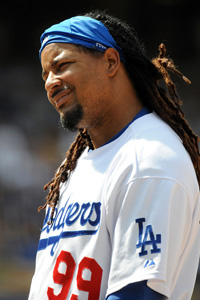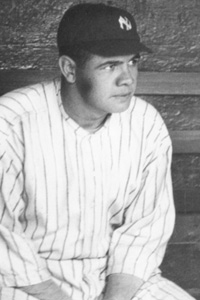Steroids shouldn't preclude the HOF
Those that know me know that I love baseball, this sums up my belief toward the baseball of this generation. I am also of the mind set that Mark McGwire, Pete Rose and Shoeless Joe Jackson should be allowed in the HOF!
Read on -
This story appears in the June 1st issue of ESPN The Magazine.
When Manny Ramirez got caught using a banned substance, baseball purists insisted that he had disqualified himself from Hall of Fame consideration. The logic is simple: The Hall's Rule 5 says election should be based on one's "record, playing ability, integrity, sportsmanship, character and contributions to the team(s) on which the player played." Since Manny fails the integrity clause, he must be punished -- excluded as unworthy.
I don't think so. In the course of doing research for my book, Cooperstown Confidential, I found that the Hall, like any shrine, is full of secrets. Here's the worst-kept one: Not every immortal is a gentleman.
Some surely were. But Tris Speaker and Rogers Hornsby, both of whom belonged to the Klan? Probably not. How about Hank Greenberg and Joe DiMaggio, with their serious mob connections? Ty Cobb bragged of committing a murder and was suspected of fixing at least one game. Grover Cleveland Alexander pitched drunk when alcohol was a federally banned substance. The list goes on.

And those are just the off-hours transgressions. Between the lines, old-timers were happy to use any substance they thought would give them an edge. In 1889, pitcher Pud Galvin drank monkey testosterone. Mickey Mantle was forced out of part of the '61 pennant race by an infection he got from the needle of a quack doctor who shot him up with a concoction of steroids and amphetamine. Sandy Koufax took so many nonanabolic steroids for his sore arm that he was sometimes "half high" on the field. Even Hank Aaron admitted to taking amphetamines once during a game. All of them are in Cooperstown -- and the walls haven't crumbled.
Of course, members of the Baseball Writers Association of America, keepers of the inductions, turned a blind eye on these (and other) indiscretions even before welcoming these stars into the Hall. Remember, it took a player, José Canseco, to spill the beans about widespread steroid use. Now, though, the writers have found religion. With the zeal of the newly converted, they voted by a 3 to 1 margin to keep Mark McGwire out of the Hall, and they threaten to do the same to anyone else who "polluted" the game with chemical enhancement.
They couldn't be more wrong. Players reflect their times. Today, grade-school students take Ritalin, and lawyers go to court on antidepressants or beta-blockers. In the end, aren't they performance enhancers? Why should ballplayers be different? They shouldn't, and baseball needs to accept that. Performance enhancement is now as much a part of the game as such other once-unimaginable innovations as night baseball, integration and free agency.
Baseball writers can be replaced.
The Hall of Fame has always been a passive and compliant institution. Now it has a chance to make history instead of merely recording it. But that will require honesty and transparency. A good start would be to judge players only against their contemporaries, only by what they do on the field. In 1998, for example, McGwire faced the same pitchers as everyone else, and he hit more home runs than anyone else. We now know other hitters were juicing then too. So were lots of pitchers. Comparing his numbers to Babe Ruth's makes no more sense than comparing Ruth's to Home Run Baker's. Different eras, different stats.

The Hall can't just exclude two generations of superstars. And if the writers don't like this, well, they need to be reminded that they serve as Cooperstown's electoral college at the pleasure of the Hall 's controllers -- a nonprofit organization, not MLB -- and they can be replaced. There are plenty of potential voters awaiting their chance: former major and minor leaguers, college coaches, magazine journalists, TV and radio broadcasters, members of SABR, fantasy leaguers and serious baseball bloggers. Those electors would be younger and less monochromatic than those in the current BBWAA, and less bound to the false pieties those writers have perpetuated over the years. What would their Hall of Fame look like? Exactly like the old one. The Cooperstown museum will include a chapter on steroids as a part of baseball's narrative, just as it includes the chapters on the Negro Leagues and how equipment evolved.
And in the plaque gallery, Manny and Bonds, A-Rod and Clemens will hang next to greats of other eras, right where they belong. They earned their spots the old-fashioned way -- by doing what was necessary to stand above their peers.
Zev Chafets is the author of Cooperstown Confidential: Heroes, Rogues and the Inside Story of the Baseball Hall of Fame (Bloomsbury USA), available in bookstores in July.
And That's What I Think and Agree With.














0 Comments:
Post a Comment
<< Home